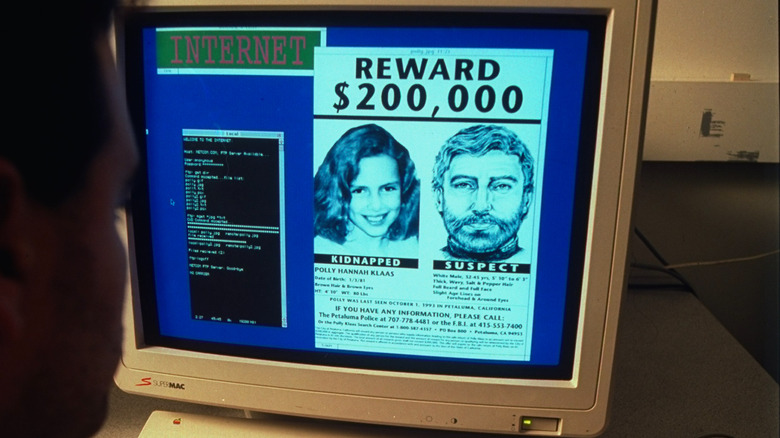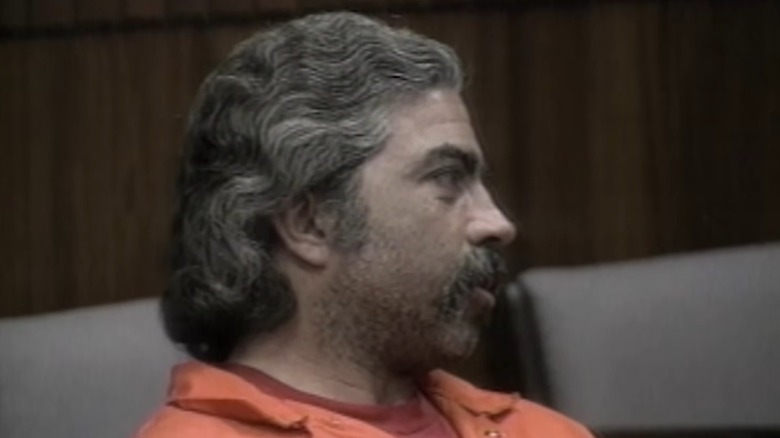The Tragic 1993 Murder Of Polly Klaas
The unlikely kidnapping and murder of 12-year-old Polly Klaas was the kind of nightmarish event that almost never happens. Klaas was not picked up from some remote location but was forcibly removed from the safety of her own home, abducted during a sleepover while her mother was asleep in another room. It would take two months for police to find Klaas' body and the upsetting details of the landmark case would go on to change U.S. law.
Klaas' kidnapping took place on the night of October 1, 1993, in the small town of Petaluma in California, when a man broke into the Klaas' home while the girl's mother, Eve Nichol, was fast asleep. According to Oxygen, at knifepoint, the intruder used electrical wire and gags to restrain the two other children at the slumber party, before leaving the home with Klaas.
In a heartbreaking near miss for the police, on-duty officers actually met the killer that night after a woman spotted a vehicle stuck in a ditch nearby several hours after the event. The driver was reportedly nervous, unkempt, and sweating profusely but the police at the scene had not yet gotten wind of the kidnapping and let him leave after helping him free his car. The police would eventually circle back to the driver several months later after evidence tied him to the awful crime.
The crime scene is found
It would take two months for the police to make a breakthrough in the Polly Klaas investigation. In the meantime, Klaas' father distributed thousands of flyers, spending $15,000 on stamps alone and the case attracted a great deal of media attention (via Fox News). Actress Winona Ryder even put up a $200,000 reward for information about the young girl.
Finally, one day in November police got the call that they needed to crack the case. A Sonoma woman, Dana Jaffe, found evidence of the kidnapping during a hike on her property — red tights, a grown man's sweatshirt, a white ligature, and a used condom, per Oxygen. The police were able to match the white ligature they found at the scene to the gags used on the girls at the slumber party and forensics matched fibers on the clothing with fibers from Klaas' home.
By fortunate coincidence, Jaffe was the same woman who had spotted the killer's car stuck in a ditch on the night of the kidnapping and she was canny enough to make the connection between the two events. When the police arrived at the scene, Jaffe mentioned the suspicious vehicle and police ran another check on the car and its owner. Sure enough, the mysterious driver was guilty of a list of crimes a mile long and had only been released from prison about six months prior.
The murderer is identified
The trail of evidence led police to Richard Allen Davis, a man with a frightening criminal history and a disturbing psychological profile. Davis had previously been in trouble with the police for a very long list of crimes, including burglary, violent assault, armed robbery, and kidnapping, and he had spent 14 years in prison already (via People). He also had the classic background of a disturbed person — as a child his home was unstable and violent and his mother had regularly punished him and his siblings by holding their hands over the gas stove. As a teen, he was already dousing cats with gasoline and setting them on fire, and the older he got the more violent he became.
When police tracked Davis down, they were able to arrest him right away for a parole violation. In custody, he initially denied his involvement in the crime but by December 4th, 1993 — he cracked. He told police that he had kidnapped Polly Klaas and strangled her in his car before hiding her body in a field outside Cloverdale.
According to SF Gate, the recorded confession was unusually unsettling. Davis claimed he had attacked the girl while he was "pretty well toasted," and then realized he would have to kill her to cover his tracks. He let her out of his car to go to the bathroom in the woods and strangled her with a piece of knotted cloth when she got back in the car. Her body was hidden under a piece of plywood.
The trial and death penalty controversy
The trial of Richard Allen Davis for the killing of Polly Klaas proved to be an upsetting affair even for a murder case. At one point in the proceedings, the defendant made an obscene gesture at Klaas' family and, at the end of his trial, he made a very unpleasant remark about Klaas' father. According to SF Gate, at the sentencing stage, Davis said "The main reason I know I did not attempt any lewd act that night was because of a statement the young girl made to me while walking up the embankment: 'Just don't do me like my dad.'" In response, Marc Klaas lurched across the courtroom in an attempt to get at Davis before he was restrained by the sheriff's deputy.
Davis was charged with first-degree murder, the conditions of which included robbery, burglary kidnapping, and attempted lewd acts with a minor. The defense argued that the accusations of molestation were speculative, but the court found him guilty anyway and Davis was sentenced to die. As of 2023, Davis is still on death row at San Quentin State Prison.
In 2019, Governor Gavin Newsom called for a moratorium on the death penalty in the state of California to the outrage of Klaas' father. "Newsom is a pig," he remarked "In 2019, he declared a death penalty moratorium in California. He told me, among other things, that he didn't want to be the governor who executes an innocent person."
Why the Polly Klaas case still matters
The Polly Klaas case was a landmark investigation in the U.S. for several reasons. The Los Angeles Times reported it was the first time investigative tools like alternative light sources and fluorescent powder had been used by the FBI to identify prints at a crime scene. Alternative light sources are now routinely used to help identify hard-to-see evidence such as hidden stains. Secondly, it was also the first time the FBI had included a psychological profiler as part of their evidence response team to help understand the motives of the kidnapper.
The biggest upshot of the case, however, was the effect it had on U.S. law. Revelations about Polly's killer, Richard Allen Davis, were so shocking it seemed incredible that he had been allowed out of jail at all. Between his extensive criminal history and his grotesque behavior at the trial, Davis's behavior sparked a desire for tougher criminal sentencing. The Polly Klaas case is often cited as one of the major events that led California to adopt its three strikes law — according to which three felonies are enough to land you a life sentence.
Curiously, while Polly Klaas' father Marc Klaas has become an outspoken advocate for the death penalty as a result of his daughter's murder, Klaas' sisters have criticized the tough-on-crime ethos that arose from the case. In an interview with The Guardian, Jess and Annie Nichol argued that their personal tragedy should not have been used to enforce punitive measures that have contributed to America's sky-high incarceration rates.




